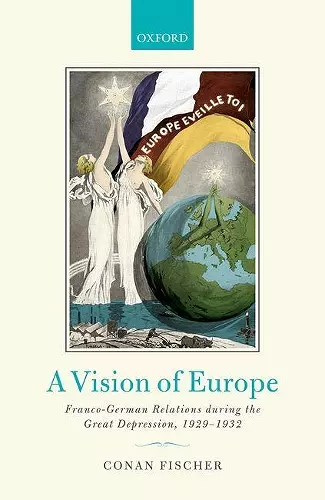A Vision of Europe
Franco-German Relations during the Great Depression, 1929-1932
Format:Hardback
Publisher:Oxford University Press
Published:9th Feb '17
Currently unavailable, and unfortunately no date known when it will be back

It is commonly held that the inter-war era marked little more than a ceasefire between two world wars, with the improvement in German-Allied relations forged at Locarno in 1925 cut short by the global economic turmoil that followed the 1929 Wall Street Crash. A Vision of Europe challenges this received wisdom, offering a fundamental re-evaluation of inter-war Franco-German relations during the Great Depression and providing a fuller understanding of the historical origins of today's European Union. It demonstrates that rather than lapsing into mutual recrimination and national egotism, France and Germany engaged with the challenges of the post-1929 slump by way of plans for a Franco-German customs union and wider bilateral economic collaboration, whether across the Rhine, in the French Empire, or elsewhere in Europe. These plans were regarded as the initial steps on the road to a European Union that would reconcile Berlin's search for national rehabilitation with France's need for national security, so providing a means of resolving the formidable legacies of the First World War and Versailles Peace Settlement. Their efforts culminated in September 1931 in a formal agreement to establish a Franco-German economic community, which included the institutional means to transform ambition into reality. Unlike comparable post-1949 diplomacy, however, these aspirations ended in failure, but they nonetheless provided an invaluable, if largely unacknowledged template for the process of (West)-European recovery in the aftermath of the Third Reich. This finely-focused study of the exchanges between individual politicians and diplomats, whether domestically or across the Rhine, also examines the relationship between the official sphere, the press, and a range of cultural associations and initiatives. It also explores the role of key economic associations and pressure groups whose energies were harnessed by Paris and Berlin in the cause of rapprochement. These were complex processes where success or failure could rest on particular personal exchanges, a badly-timed election, or unanticipated economic upsets that compromised diplomacy's best-laid plans.
In about two hundred pages, Fischer presents us with a detailed but highly readable narrative laid out in six chronological chapters that combine mastery of the sources with sparkling analysis; well-chosen subheadings help to resolve inevitable tensions between the thematic and chronological in marshalling abundant evidence from a host of politicians, diplomats and from NGO activists. * Gearóid Barry, NUI Galway, European History Quarterly *
[Fischer] builds a strong case for reconsidering the nature of Franco-German relations during the first years of the Depression....Recommended. * CHOICE *
[Fischer] does much to correct some of our preconceived ideas about Franco-German relations between Stresemann's death and the collapse of Weimar democracy. * Colin Storer, History *
- Winner of Shortlisted for the 2018 R. Gapper Book Prize for the best book in French Studies.
ISBN: 9780199676293
Dimensions: 241mm x 183mm x 20mm
Weight: 474g
222 pages